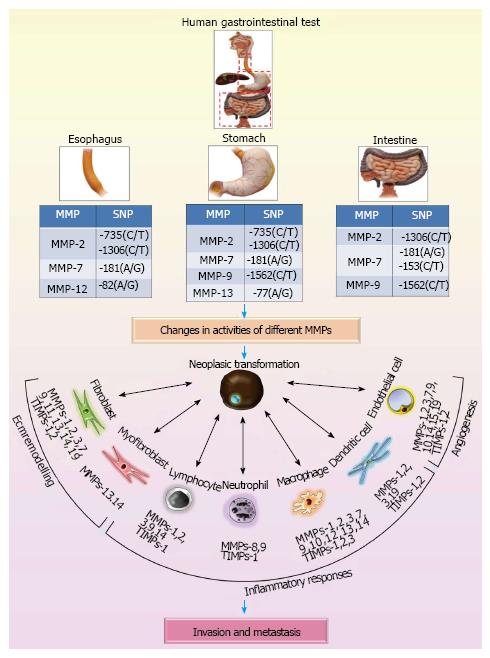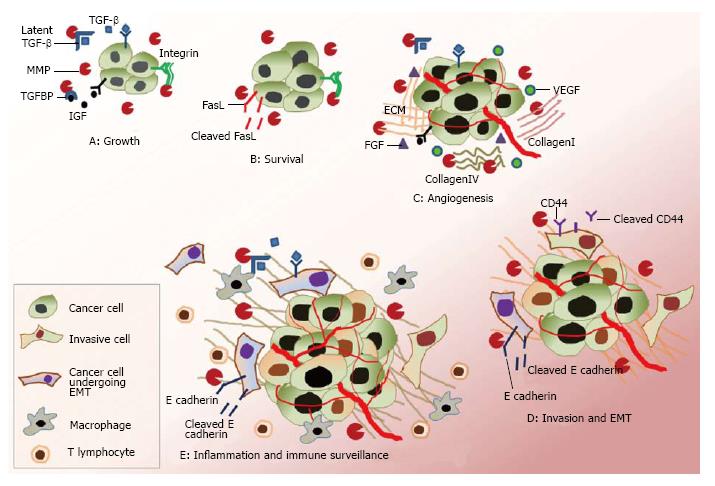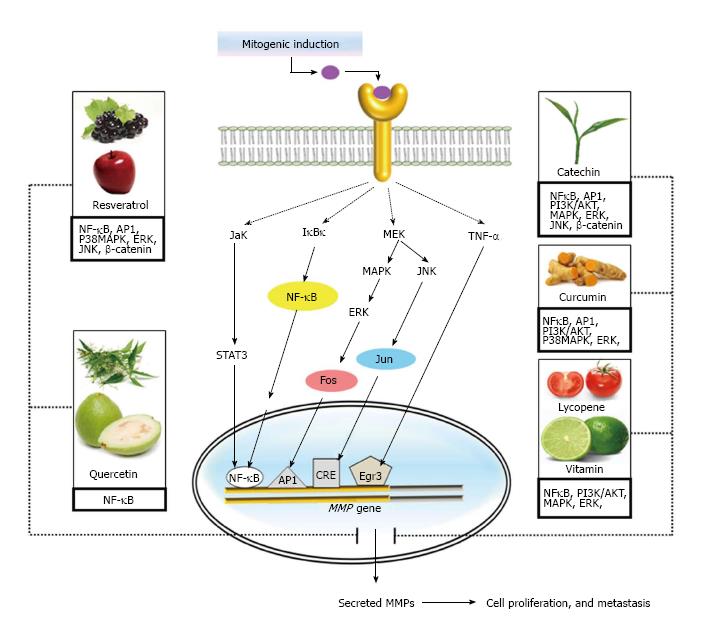Copyright
©2014 Baishideng Publishing Group Inc.
World J Biol Chem. Aug 26, 2014; 5(3): 355-376
Published online Aug 26, 2014. doi: 10.4331/wjbc.v5.i3.355
Published online Aug 26, 2014. doi: 10.4331/wjbc.v5.i3.355
Figure 1 Matrix metalloproteinases polymorphism in gastrointestinal cancers.
Single nucleotide polymorphism (SNP) for matrix metalloproteinases (MMP) genes in gastrointestinal organs (e.g., esophagus, stomach and intestine) of human has been reported. These SNPs are involved in changing MMPs activities in neoplastic transformation of gastric tissues in cancer patients. In addition to cancerous cells, the secretion of MMPs by fibroblasts, myofibroblasts, lymphocytes, neutrophils, macrophages, dendritic cells and endothelial cells has been documented. Both MMPs and tissue inhibitor of metalloproteinases (TIMPs) are important in regulation of extracellular matrix (ECM) remodeling, inflammatory responses and angiogenesis for cancer invasion and metastasis.
Figure 2 Roles of matrix metalloproteinases in cancer progression.
The matrix metalloproteinases (MMPs) play complex but important roles during different stages of cancer progression. A and B: Growth and survival. MMP modulates cellular growth by cleaving different cellular components. It promotes cellular growth by releasing IGF from insulin growth factor-binding protein (IGF-BP). MMP-7 promotes cell survival by resisting apoptosis through cleaving Fas ligand (FasL). MMP modulates integrin signalling by regulating the extracellular matrix (ECM), which regulates growth. MMP activates transforming growth factor-β (TGF-β) from its latent TGF-β complex, which plays important roles in tumour development; C: Angiogenesis. MMP promotes angiogenesis through recruitment of VEGF, FGF. Angiogenesis is further promoted by degradation of extracellular component like collagen I, IV, fibrin, etc., which also act as pro-angiogenic factors; D: Invasion and epithelial to mesenchymal transition (EMT). MMP modulates invasion by degrading specific cellular components, including E-cadherin and CD-44. MMP is involved in mesenchymal transition through cleavage of E-cadherin and modulating TGF-β signaling. MMP-3 is directly involved in EMT, whereas MMP-9 has roles in differentiation; E: Inflammation and immune surveillance. MMPs also regulate immune reactions against the cancer cells. MMP-mediated TGF-β activation inhibits T lymphocyte proliferation. MMPs also modulate cancer-cell sensitivity to natural killer cells and leukocyte accumulation by cleaving different chemokines and cytokine families. VEGF: Vascular endothelial growth factor; FGF: Fibroblast growth factors.
Figure 3 Role of dietary antioxidants in modulating matrix metalloproteinases action.
Different ingredients in diet possess antioxidant activity. They act on various signalling pathways and transcription factors which modulate the synthesis and secretion of matrix metalloproteinases (MMPs). Therefore regulates MMP-dependent cellular processes, including proliferation and metastasis. TNF: Tumor necrosis factor; MAPK: Mitogen-activated protein kinases; MEK: Methyl ethyl ketone.
- Citation: Verma S, Kesh K, Ganguly N, Jana S, Swarnakar S. Matrix metalloproteinases and gastrointestinal cancers: Impacts of dietary antioxidants. World J Biol Chem 2014; 5(3): 355-376
- URL: https://www.wjgnet.com/1949-8454/full/v5/i3/355.htm
- DOI: https://dx.doi.org/10.4331/wjbc.v5.i3.355











